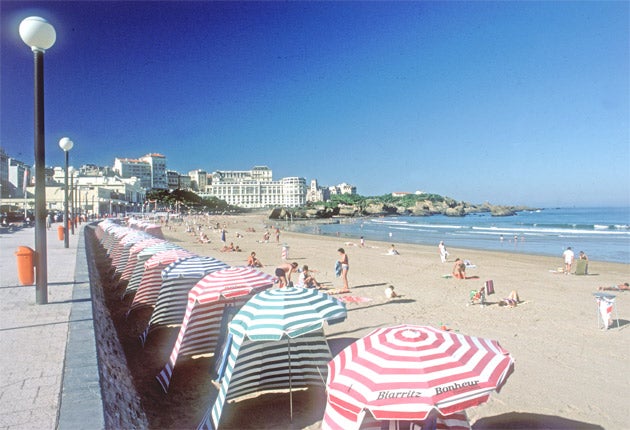'The magnificent seven' hotels see return of the super-rich

Crisis? What crisis? Judging by the flood of super-rich foreign tourists into France this summer, the recession is over, at least for some.
The top Paris hotels have long regarded themselves as a leading indicator of the financial health of the world's estimated 10 million millionaires, and in 2008, after the start of the world banking crisis, they feared the worst as occupancy slumped, with some suites standing empty for days at a time. Even the super-wealthy contented themselves with an "ordinary" room at the Ritz or George V at about €700 (£575) a night.
Bookings recovered only partially last year. But now things appear to be changing. The seven top hotels in Paris – the "magnificent seven" – have been virtually fully booked since the beginning of July at an average room rate of more than €900 a night. Much the same story is reported from the Côte d'Azur and Biarritz.
"July was exceptional. Things could hardly be better," said Didier Le Calvez, director general of the Bristol, a few steps from the Elysées Palace and the Parisian hotel of choice for Middle Eastern princes and Hollywood film stars.
On the other side of the Champs Elysées, the Hotel George V is also chock full with wealthy Russians, Brazilians, Indians and Middle Eastern minor royalty. The hotel's director, Marc-Oliver Raffray, says that all 60 suites – at prices ranging from €13,000 to €3,000 a night – have been booked for the whole summer. The five other five-star hotels in Paris – the Ritz, Crillon, Meurice, Plaza-Athénée and Fouquet's Barrière – report more than 90 per cent occupancy from all over the world.
"Now the economy seems to be booming in Brazil and Asia," said Mr Calvez at the Bristol. "We are also getting lots of American and Australian dollars. Middle Eastern clients are back. It is a special moment when all our markets are buzzing at once."
And although Middle Eastern visitors are thinning out a little, with the beginning of this year's early Ramadan religious festival, wealthy Russians, Indians and Brazilians are taking their places. At Biarritz, at the foot of France's Atlantic coast, the Hotel du Palais, dominating the main beach, is fully booked for August at an average room rent of €500 a night. Jean-Louis Leimbacher, the director general of the hotel, said that 60 per cent of his clients were foreign, the majority of them Russian.
Vanguelis Panayotis, development director at the hotel and leisure group MKG, said that the occupancy rate at top hotels in France was back to pre-crisis levels. France was benefiting, in part, from the relative weakness of the euro against the dollar and other currencies, he said, but there also seemed to be no shortage of money among the elites of Asia (other than Japan), Russia and South America.
The lower reaches of the French tourism market are also enjoying a relative boom this year, after a poor 2009. The fall in the value of the euro has brought back visitors from Britain and the United States. The Germans, Dutch and Belgians are choosing to stay close to home rather than book expensive holidays on the other side of the world. "For them nearer to home means France," said Didier Arino, director of the study group Protourisme.
There had been an increase of up to 10 per cent in European visitors to France this summer, he said. The average price of a hotel room had increased by 10 per cent.
Join our commenting forum
Join thought-provoking conversations, follow other Independent readers and see their replies
0Comments